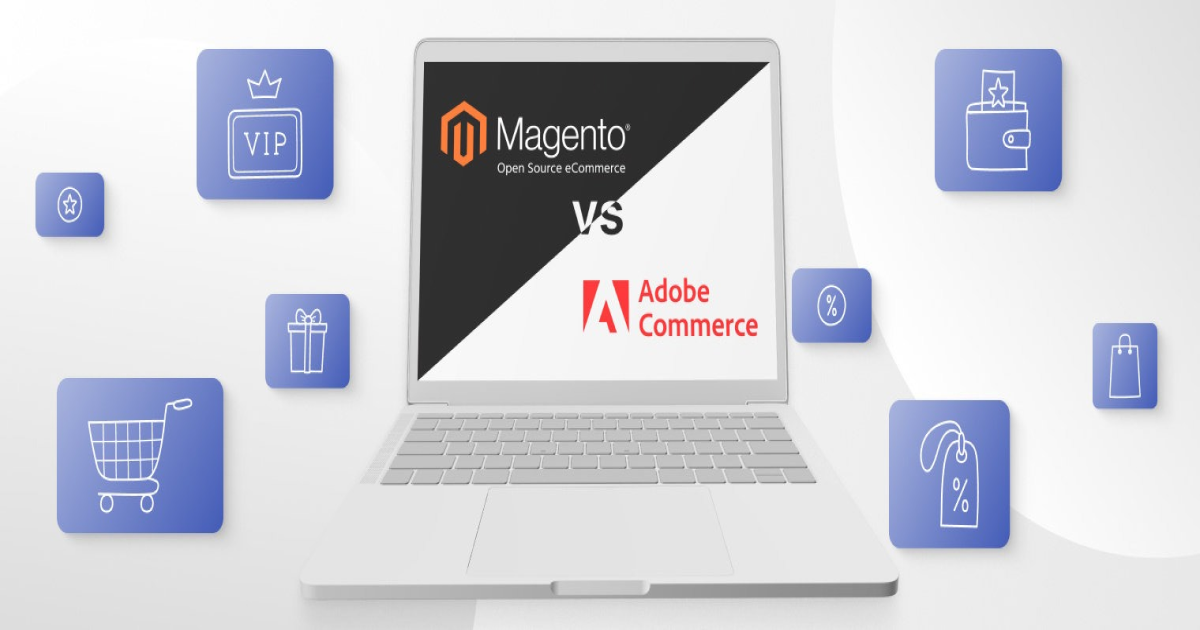The article was initially published in WebMeridian blog.
For any business, choosing an eCommerce platform that aligns with the budget and objectives of the business plan is essential. It doesn’t take long to realize that there are many options, each claiming to be the best for your needs.
How do you go about picking the right one? Well, in our opinion, reviews present an opportunity to overview the platforms for preliminary research, which is great for narrowing down options.
In this article, we look at two of the most attractive eCommerce platforms on the CMS market: Shopware 6 and Magento 2. They offer access to all the features a business can need to run an eCommerce operation. That doesn’t mean they are the same. Shopware 6 is an intuitive, modernized, and easy-to-use platform, while Magento 2 offers a much broader canvas, perfect for advanced customization.
To find out which one fits your needs and mission, let’s dive into a comparison between Shopware vs Magento to see how they stack up against each other.
Shopware 6 vs. Magento 2: General Overview
Shopware 6 is an open commerce platform based on Symfony Framework and Vue and supported by a global community and more than 1,500 extensions for various functions.
Shopware is well known for its open-source technology, open and collaborative community of developers, agencies, and merchants contributing to its innovation and growth.
On average, Shopware 6 is easier to use, doesn’t require a lot of technical skill to customize, but offers enough variety and capabilities to run an eCommerce operation with an easy setup and deployment.
Magento 2 is an open-source platform owned by Adobe. The platform is based on the Model View ViewModel (MVVM) system, giving it a more robust separation between the Model and View layers, and it is developed in PHP and Zend framework.
Magento 2 is known for being a flexible and scalable eCommerce solution, having native AI, B2B, and B2C capabilities, and platform architecture, and enjoys a large community of developers, merchants, and partners contributing to the platform’s innovation and growth.
Magento 2 vs Shopware 6: Comparison
To give you a deeper look into what you can get from Shopware and Magento, join us on a comparison based on the most cited deciding factors when looking for an eCommerce platform.
Pricing
What can you expect to pay when using one or the other? Let’s talk pricing:
Shopware 6
Shopware pricing is tiered, with features and support level enhancements as you go up the tiers. They include:
- Rise — This is the basic plan for small businesses that do not require more than basic features. It starts from $600 at the time of writing.
- Evolve — This plan is designed for mid-sized businesses that need more advanced features like B2B features, CMS rules, quick view, advanced search, DDoS protection, and more.
- Beyond — This premium plan has enterprise-level features like high availability architecture, incident service level target, surge capacity monitoring and response, global scaling on AWS and Azure, and more.
Shopware development and customization are enabled by the platform’s free, open-source version called Shopware Community Edition with access to core features.
Shopware has a flexible pricing model based on your annual gross merchandise value (GMV) and average order value (AOV), so you only pay for what you use.
There are no hidden costs or commissions, with a full breakdown of features and support shown clearly in each plan. Shopware 6 offers a free trial for 30 days for all plans.
Magento 2
Magento has two main pricing plans. They include:
Magento Open Source — This is the free, open-source version of Magento 2 with access to core features, which is ideal for developers and merchants who want to build custom shops.
Adobe Commerce — This is the paid/managed version of Magento 2 that gives you access to a long list of advanced, out-of-the-box platform features. Within Adobe Commerce are two sub-plans:
- Adobe Commerce Pro — The all-in-one package for merchants of any size or business model.
- Adobe Commerce Managed Services — The plan with expert-level managed services to minimize disruptions and decrease risk.
Both sub-plans rely on pricing based on your annual gross merchandise value (GMV) and the average order value (AOV).
It is worth noting that Adobe Commerce does not have very transparent pricing, will charge you fees for switching plans, and require a minimum one-year contract with Adobe, among other concessions that may not be for the merchant or developer looking for customization.
Shopware 6 and Magento 2 have different plans for different needs and budgets. Shopware looks more flexible, transparent, and affordable than Magento 2. However, Magento 2 has a slight edge over Shopware in the features, support, and integrations departments.
In your test ride of Magento 2 vs Shopware 6, use the free trial or open-source versions to experience them first-hand.
Customization
The level of customization you can do dictates how true to your vision the online store can be. Both platforms provide different levels of customization, and here is how they compare:
Shopware 6
Shopware provides a visual page builder for creating pages with drag & drop.
There is a rule builder for creating individual rules for specific purposes.
The storytelling feature allows you to guide customers on a designed journey through your shop with scroll navigation.
The app marketplace allows you to access an extensive library of extensions and plugins for adding more functionality or integration to your store.
Magento 2
Magento provides a similar drag & drop interface for easy customization of content and design.
Roles and permissions can be set up for each area with precision.
There is native AI that can be used for customer segmentation, product recommendations, visual similarity search, etc.
Magento 2 users can access an extensive library of extensions and plugins for adding functionality.
The Shopware software experience could improve customization by
- Reducing its dependence on plugins and extensions to provide advanced functionality and integration.
- Providing a more extensive library of plugins and extensions without compatibility issues that some suffer.
- Making advanced customization easier. Most users who want advanced customization may need to use the API or Symfony framework to develop custom plugins or modify the core code.
Magento 2, on the other hand, could improve by
- Reducing the complexity of the platform, which often gets more complicated as you try more advanced customization.
- Offering the platform at friendlier prices and more transparency on what to expect.
- Making updates easier. Updates are lengthy and may sometimes cause compatibility issues with your extensions or customizations after updating.
SEO & Marketing
The Shopware eCommerce platform provides easy access to SEO and marketing features from the admin panel. You can easily change meta titles, meta descriptions, robots.txt, canonical tags, URLs, sitemaps, etc. In addition to that, you can automate the SEO settings for products, categories, and manufacturers.
You can use features like Storytelling, Flow Builder, and Rule Builder to specify how customers experience the brand and product, how processes flow based on actions, and rules for functions like offering discounts, coupons, free shipping, or other incentives.
Magento 2 leverages the same standard SEO capabilities but offers unique features that further advance its CMS offering. This includes the Native AI, in the form of Adobe Sensei, for AI-powered marketing and SEO functionalities.
The B2B and B2C capabilities mentioned earlier help with marketing to specific customer bases. At the same time, the Adobe integrations allow users access to add functionalities that improve the eCommerce store customer experience and positively impact SEO and marketing efforts.
On the SEO & Marketing front, Magento goes the extra mile to integrate not just a comprehensive set of tools but also the latest in technology.
Extensions
As mentioned, Shopware 6 depends on extensions and plugins to extend its functionalities and advanced customization. The only problem is that it doesn’t have as many of them as it could or should. However, you can find apps for CMS, custom products, shopping options, payment methods, marketing tools, and more.
Magento 2, on the other hand, has a much larger library of more than 5000 plugins and extensions compared to Shopware, which has slightly over 1000 plugins and extensions. On this front, Magento emerges as the one with the edge.
When choosing an eCommerce platform, it’s worth noting that both provide what you would need if you were a small or mid-sized business, but Shopware’s abilities may taper out on the advanced end.
eCommerce Features
In a head-to-head of the eCommerce CMS features presented by these platforms, we see a unique set of capabilities in each. Here is a look at the highlights:
Product management
Both platforms allow you to create and manage various types of products, including simple, grouped, bundles, configurable and downloadable products. Shopware 6 has the more user-friendly interface for product management with a visual editor for customizing the look and feel of product pages.
Magento 2 brings more advanced features for product management, including price rules, product reviews, custom attributes, and more.
Scalability
Both platforms are scalable and can handle large volumes of transactions or traffic. Magento 2 stands out as the more suitable option for large scale and enterprise-level businesses that need more flexibility and customization.
Shopware 6 is more suitable for small medium-sized eCommerce businesses that require a simpler deployment.
Payment options
Both platforms support a wide range of payment methods including popular ones like Amazon Pay, Stripe, PayPal, Klarna, and more. Shopware 6 supports over 30 payment methods while Magento 2 supports over 50.
Magento 2 presents more options for configuring payment methods, such as setting minimum and maximum order amounts, enabling or disabling specific countries, and more.
Design and themes
Magento 2 and Shopware 6 have a variety of themes, both free and paid, that are customizable and responsive. Shopware 6 offers over 100 themes, while Magento 2 has more than double that number.
Shopware 6 has the advantage of having a visual editor that allows customization without coding. Using Magento 2 designs and themes may require more coding skills, but offer more opportunity for modification.
Shopping cart
The two platforms offer ways to create and manage the shopping cart for customers. Magento 2 offers more options for configuring, allowing you to set things like minimum and maximum order quantities, enabling persistent cart, applying coupon codes and more.
Shopware 6 is simpler and more user-friendly, but may be less flexible in comparison.
Checkout
On both platforms, you can provide a fast and secure checkout. You can choose from different checkout types including multi-page, one-page, or one-step checkout. You can also customize the checkout fields, enable order comments, add terms and conditions and more.
Magento will give you access to more advanced features like split database performance, PayPay in-context checkout, instant purchases, and more. The checkout on Shopware is more modern and intuitive, but may not have all the functionalities.
Other eCommerce features like shipping methods, SEO & marketing order management, and tax calculation are all provided, but the comparison plays out the same; Magento offers more options to customize, with a steeper learning curve depending on what you want to change, while Shopware 6 makes the process much easier, but with less flexibility.
Support & Community
Shopware 6 has a growing pool of developers, partners, and customers who can provide you with help and advice. You can access the community forum, the Slack channel, the blog, the documentation, the academy, and the events connected with other Shopware users and experts.
You can also get professional support from Shopware and its certified partners, depending on where you are on your plan. You can choose between:
- Shopware Community Store — This is a free support option where you can ask questions and get answers from other Shopware users in the community forum.
- Shopware Professional Support — This is a paid support option where you can access technical assistance from Shopware via email or phone, as well as get exclusive features, security patches, and updates.
- Shopware Enterprise Support — This premium support option gives you access to dedicated account management, SLA guarantees, priority response, and 24/7 emergency support from Shopware.
When we compare Shopware vs. Magento 2, the former has a smaller community that mainly speaks German, which may introduce difficulties in communication or finding information in other languages.
Magento 2 has a large and active community of developers, customers, and partners that can give you help and advice with a community forum, the Stack Exchange site, the blog, the academy, and more.
You can get support from options that include:
- Magento Open Source Support — This offers a free support option where you can ask the community forum or Stack Exchange site for advice.
- Magento Commerce Support — This is a paid support option where you can get technical assistance from Magento via phone or email. You get exclusive access to patches, hosting, updates, and exclusive features.
- Magento Business Intelligence Support — This is a premium support option where you can get data analysis and insights from Magento via email or phone, in addition to dashboarding, advanced reporting, and data visualization.
We Can Help You Build A Shopware 6 or Magento 2 Store
If you’re looking for a reliable and professional e-commerce service provider specializing in Shopware 6 and Magento 2, look no further than our service. We can help you create a stunning, high-performing online store that meets your business goals, whether you need Magento or Shopware services.
We can also help you with a Magento 2 migration to Shopware or vice-versa and bring the expertise, experience, and dedication to deliver the best solutions for your e-commerce needs.
Contact us today to learn more about our Magento 2 and Shopware development services and how we can help you take your e-commerce business to the next level.
We offer a free consultation and quote for your project. You can also check out our portfolio and testimonials to see some of the successful Shopware 6 or Magento 2 projects we have completed for our clients.
We look forward to hearing from you!





